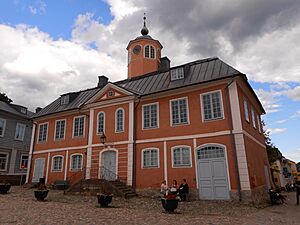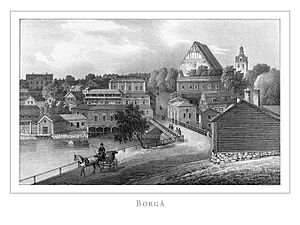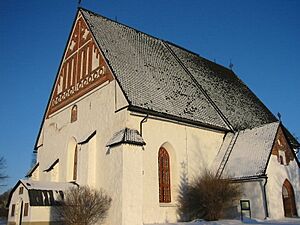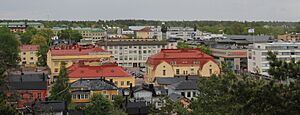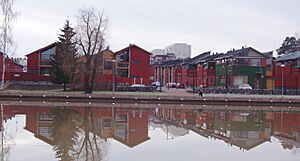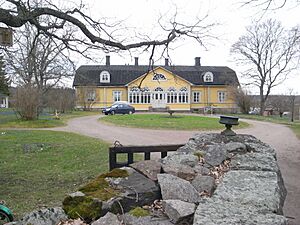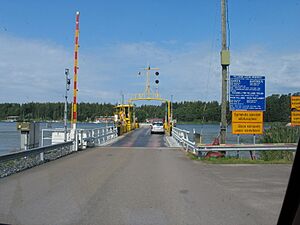Porvoo facts for kids
Quick facts for kids
Porvoo
Porvoo – Borgå
|
||
|---|---|---|
|
City
|
||
| Porvoon kaupunki Borgå stad |
||
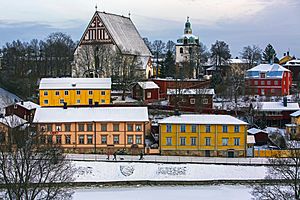
A view of buildings in the Porvoo Old Town, including the Porvoo Cathedral
|
||
|
||
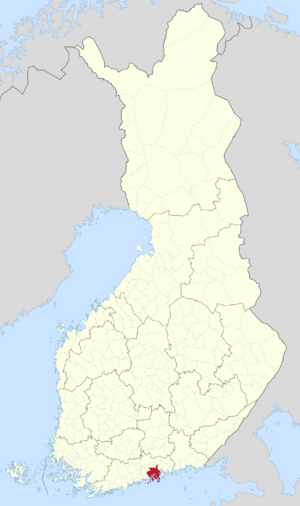 |
||
| Country | ||
| Region | Uusimaa | |
| Sub-region | Porvoo sub-region | |
| City rights | 1347 or c. 1380 | |
| Area
(2018-01-01)
|
||
| • Total | 2,139.81 km2 (826.19 sq mi) | |
| • Land | 654.56 km2 (252.73 sq mi) | |
| • Water | 1,484.49 km2 (573.16 sq mi) | |
| Area rank | 131st largest in Finland | |
| Population
(2023-12-31)
|
||
| • Total | 51,289 | |
| • Rank | 19th largest in Finland | |
| • Density | 78.36/km2 (203.0/sq mi) | |
| Population by native language | ||
| • Finnish | 63.7% (official) | |
| • Swedish | 27.8% (official) | |
| • Others | 8.5% | |
| Population by age | ||
| • 0 to 14 | 16.7% | |
| • 15 to 64 | 61.5% | |
| • 65 or older | 21.8% | |
| Time zone | UTC+02:00 (EET) | |
| • Summer (DST) | UTC+03:00 (EEST) | |
| Climate | Dfb | |
Porvoo is a historic city in Finland. It is located on the southern coast, by the Gulf of Finland. Porvoo is part of the Uusimaa region. About 51,000 people live in Porvoo. It is one of the largest cities in Finland.
Porvoo is about 50 kilometres (30 mi) east of Helsinki, the capital city. It was one of Finland's six medieval towns. Porvoo is first mentioned as a city in the 1300s. It is home to the Swedish-speaking Diocese of Borgå church.
The Porvoo Old Town is a very popular place for tourists. It has many old buildings from the 1700s and 1800s. The Porvoo Cathedral from the 1400s is also there. The Old Town and the Porvoonjoki River Valley are famous as one of Finland's National landscapes of Finland.
Porvoo is a bilingual city. This means it has two official languages: Finnish and Swedish. Most people speak Finnish. About 64% of the people speak Finnish. About 28% speak Swedish.
Porvoo's neighboring towns are Askola, Loviisa, Myrskylä, Pornainen, and Sipoo.
Contents
Understanding the Name Porvoo
The city's name comes from an old Swedish fortress. This fortress was near the Porvoonjoki River. The name Porvoo is the Finnish version of the Swedish name Borgå.
The Swedish name Borgå comes from two words:
So, the name means "Castle River".
Porvoo's Coat of Arms
Porvoo's coat of arms is based on an old city seal. It shows a blue shield with a silver, tulip-shaped letter C. This "C" might stand for the Latin word castrum, which also means "castle".
The city council approved this design on March 23, 1960. The government officially confirmed it on June 1 of the same year.
A Look at Porvoo's History
People have lived in the Porvoo area since the Stone Age. Long ago, the Porvoonjoki River was an important trade route. Finnish tribes used it to move goods.
Swedish people settled in Porvoo in the 1200s and 1300s. This happened after a crusade against the Tavastians in 1249–1250. The Catholic Church and the Swedish kingdom led this settlement. New settlers came from Svealand and received help to start their lives.
Early City Life
The first written records of Porvoo are from the early 1300s. Around 1380, Porvoo became the third town in Finland to get official town rights. This meant it could act as a proper city. Some people say it was founded even earlier, in 1347. If so, it would be the second oldest city after Turku.
In 1721, Sweden lost the city of Vyborg to Russia. Because of this, the main church office moved to Porvoo in 1723. At that time, Porvoo was the second largest city in Finland.
In 1760, a big fire destroyed about two-thirds of Porvoo's buildings. But when the city was rebuilt, they kept the old street plan. New buildings were put on the same medieval foundations.
Porvoo's Role in Finnish History
In 1808, Russian armies took over Finland. Sweden then had to give Finland to Russia in 1809. This led to the Diet of Porvoo in 1809. This event was very important for Finland. Tsar Alexander I made Finland an independent Grand Duchy. This meant Finland had its own government, even though it was part of Russia.
In 1923, after Finland became independent, the church office in Porvoo changed. It became the Swedish-speaking Diocese of Porvoo of the Evangelical Lutheran Church of Finland.
The Porvoo Common Statement is an important church agreement. It was made in Porvoo Cathedral between Anglican and Lutheran churches. This agreement created the Porvoo Communion.
In 1997, the old city of Porvoo and the surrounding rural area joined together. This formed the new, larger city of Porvoo we know today.
How Porvoo Has Grown
Exploring the Old Town

Porvoo is famous for its "Old Town." In Finnish, it's called Vanhakaupunki. In Swedish, it's Gamla Stan. It has narrow medieval streets and many wooden houses. These houses were built in the 1600s and 1700s.
In the 1800s, there was a plan to tear down the Old Town. But people protested, and the plan was stopped. Instead, a new part of town was built next to the Old Town. This new part also had wooden houses, but they were arranged in a grid pattern.
Jokikatu is a pedestrian street in the Old Town. Like other streets there, it has many restaurants, coffee shops, and antique stores.
The main building in the Old Town is the medieval Porvoo Cathedral. It's made of stone and brick. This cathedral gave its name to the Porvoo Communion. This is an agreement between different Anglican and Lutheran churches. The cathedral looks like other old churches in Finland. It was designed by the same unknown German architect.
The cathedral has burned down five times. The most recent fire was on May 29, 2006. The roof was destroyed, but the inside was mostly saved.
The Old Town is a big draw for tourists. Many visitors from Helsinki take day trips to see it. The Old Town also hosts special events, like a Christmas market every year.
Modern Porvoo Developments
Later, people wanted to build on the western side of the river. There were plans for new bridges. In 1990, a design competition was held. The winning design included a second vehicle bridge and a pedestrian bridge. New houses are being built there. Their design is inspired by the old storehouses on the other side of the river.
A large business park called King's Gate (Finnish: Kuninkaanportti) is also being built.
Porvoo's railway station does not have regular train service. However, special museum trains run from Kerava on summer weekends. These trains use old steam locomotives or diesel railcars.
A new hotel, Runo Hotel, opened in Porvoo's Old Town on May 31, 2021.
Porvoo's Neighborhoods and Villages
Porvoo has many different areas.
City Districts
Some of the city districts include Hornhattula, Keskusta (City Centre), Myllymäki, and Vanha Porvoo (Old Porvoo).
Suburbs
Suburbs include Hamari, Gammelbacka, Huhtinen, and Tarmola.
Villages
- Suomenkylä (Finnby) is a village north of the city center, by the Porvoo River. It has an old school founded in 1898. There are also two burial places from the Bronze Age here.
- Kerkkoo (Kerko) is another village north of Porvoo, also by the river. It has an active school that is over 100 years old. An ancient stone axe from the Bronze Age was found in Kerkkoo.
- Other villages include Pellinki (Pellinge), Emäsalo (Emsalö), and Hinthaara (Hindhår).
Porvoo's Population and Languages
Population Growth
The city of Porvoo has about 51,289 people. This makes it the 19th most populated city in Finland. The Porvoo region has a total population of about 59,485.
About 8.8% of Porvoo's population has a foreign background. This is a little less than the average for all of Finland.
| Year | Population |
|---|---|
| 1990 |
41,930
|
| 1995 |
43,315
|
| 2000 |
44,969
|
| 2005 |
46,982
|
| 2010 |
48,768
|
| 2015 |
49,928
|
| 2020 |
50,619
|
Languages Spoken in Porvoo
Population by mother tongue (2023) Finnish (63.7%) Swedish (27.8%) Russian (1.3%) Estonian (1.2%) Arabic (0.8%) Albanian (0.7%) Vietnamese (0.6%) Other (3.9%)
Porvoo is officially bilingual. This means both Finnish and Swedish are official languages. Most people, about 63.7% of the population, speak Finnish as their first language.
There are also many Swedish speakers in Porvoo. They make up about 27.8% of the population. About 8.5% of people in Porvoo speak other languages as their first language.
Since English and Swedish (or Finnish for Swedish speakers) are taught in schools, many people can speak two or even three languages. At least 50 different languages are spoken in Porvoo. The most common foreign languages are Russian, Estonian, Arabic, and Albanian.
People from Other Countries
| Population by country of birth (2022) | ||
| Nationality | Population | % |
|---|---|---|
| 47,111 | 92.0 | |
| 479 | 0.9 | |
| 418 | 0.8 | |
| 367 | 0.7 | |
| 209 | 0.4 | |
| 190 | 0.4 | |
| 161 | 0.3 | |
| 146 | 0.3 | |
| 130 | 0.3 | |
| 113 | 0.2 | |
| 97 | 0.2 | |
| Other | 1,811 | 3.5 |
As of 2023, about 8.8% of Porvoo's population has a background from another country. This means 4,492 people. About 4,385 people were born outside Finland. Most foreign-born residents came from Estonia, the former Soviet Union, Sweden, and Vietnam.
The number of new residents from other countries is growing. This will increase the number of foreign residents in Porvoo in the future.
Religious Groups
In 2023, the Evangelical Lutheran Church of Finland was the largest religious group in Porvoo. About 64.8% of the population belonged to this church. Other religious groups made up 2.2% of the population. About 33.0% of the population did not have a religious affiliation.
Porvoo's Economy
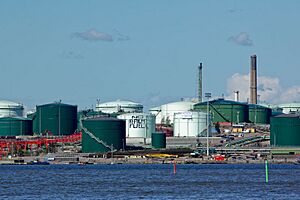
In 2011, Porvoo had over 20,000 jobs. Most jobs were in services (64.7%) and processing (32.5%). Only a small part (1.6%) was in primary production, like farming.
In December 2012, the unemployment rate in Porvoo was 8.4%. This was lower than the national average of 10.7%. Porvoo had 3,389 businesses at that time.
More new companies have started in Porvoo than have closed down. The number of companies has grown by about 140 each year. Most companies in Porvoo are small, with fewer than five employees.
In 2014, some of the biggest employers in Porvoo were Neste (with 2,000 jobs), Borealis Polymers, and Ensto.
Porvoo is known for its strong economy. In 2012, the Porvoo region was ranked number one for competitiveness in Finland. In 2013, it was ranked fourth. This ranking looks at things like how much workers produce, how many people have jobs, and how many new ideas come from the area.
Sports in Porvoo
The local sports team, Borgå Akilles, plays bandy. This is a sport similar to ice hockey. They play in the highest league, Bandyliiga, and have won the Finnish championship twice.
- Sami Hyypiä, a famous former football player for Liverpool and the Finnish national team, is from Porvoo.
- Lauri Happonen, also known as Cyanide, a retired professional League of Legends player, is also from Porvoo.
Culture in Porvoo
Local Food and Treats
Porvoo is famous for a special pastry called the Runeberg torte. It was created by a local pastry chef. It's said that Johan Ludvig Runeberg, Finland's national poet, ate them for breakfast. His wife, Fredrika Runeberg, also made them using ingredients she had at home.
Another traditional dish from Porvoo is grilled herring with onion rings and dill. The nearby island of Pellinki is known for its fish soup and nettle soup.
Porvoo also has local factories that make sweets and ice cream. The most famous are the Brunberg Chocolate Factory and the Old Porvoo Ice Cream Factory.
Literature and Libraries
Johan Ludvig Runeberg, Finland's "national poet," lived in Porvoo from 1837 until he passed away. His home is now a museum that opened in 1882.
The Borgå Gymnasium in Porvoo has Finland's oldest public library. It was founded in 1728. This library has rare books, some from the 1400s. It even has an original copy of Se Wsi Testamenti from 1548 by Mikael Agricola. Today, it's a museum library and not open to the public.
Getting Around Porvoo
Porvoo is on the E18 road. This road goes from Helsinki to Saint Petersburg. The Porvoo Highway is part of this route and is very important for travel to Helsinki. Other important roads connect Porvoo to nearby towns.
Porvoo does not have regular passenger train service. The last passenger trains stopped in 1981. However, there are plans to connect Porvoo to the main rail network in the future. There is no airport in Porvoo.
Finland's largest port for cargo, the Port of Kilpilahti, is located near Porvoo. In the Porvoo River, right in the city center, there is a place for guest boats to dock. There is also a ferry that takes tourists between Helsinki and Porvoo, called the MS J. L. Runeberg.
Famous People from Porvoo

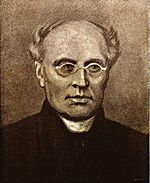
Many notable people have connections to Porvoo:
- Albert Edelfelt (1854–1905), a famous Finnish-Swedish painter.
- Johan Ludvig Runeberg (1804–1877), Finland's national poet.
- Walter Runeberg (1838–1920), a Finnish sculptor and son of the poet.
- Oppi Untracht (1922–2008), an American master metalsmith and writer.
- Ville Vallgren (1855–1940), a Finnish sculptor.
Sports Personalities
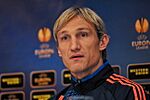
- Sami Hyypiä (born 1973), a former football player who played for Liverpool and was captain of the Finland national football team.
- Sami Laakkonen (born 1974), a bandy player who helped Finland win its first World Championship.
- Simo Lampinen (born 1943), a Finnish former rally driver.
- Lauri Lehtinen (1908–1973), a Finnish long-distance runner who won a gold medal at the 1932 Summer Olympics.
- Adolf Lindfors (1879–1959), a Finnish wrestler who won a gold medal at the 1920 Summer Olympics.
- Arthur Lindfors (1893–1977), a Finnish wrestler who won two silver medals at the 1920 and 1924 Summer Olympics.
Porvoo's International Connections
Porvoo has "twin towns" or "sister cities" around the world. These are cities that have special friendly relationships.
 Dalvíkurbyggð, Iceland
Dalvíkurbyggð, Iceland Dinkelsbühl, Germany
Dinkelsbühl, Germany Hamar, Norway
Hamar, Norway Hancock, Michigan, United States
Hancock, Michigan, United States Kamień Pomorski, Poland
Kamień Pomorski, Poland Lund, Sweden
Lund, Sweden Viborg, Denmark
Viborg, Denmark Viimsi, Estonia
Viimsi, Estonia Viljandi, Estonia
Viljandi, Estonia
Images for kids
See also
 In Spanish: Porvoo para niños
In Spanish: Porvoo para niños



